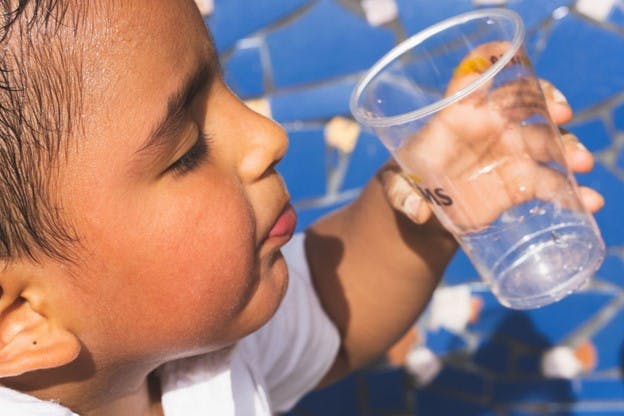🌟 New Arrival! Upgrade Your Water with Our Advanced Pitcher Filter. Shop Now
December 2023
Understanding Dehydration: Is It as Simple as Drinking More Water?
Staying hydrated is one of those things we all know we should do, but sometimes life gets busy and we forget. Like any well-oiled machine, your body needs to be properly fueled and lubricated to function at its best. Yet it's easy for dehydration to sneak up on us when we're chasing our kids, hustling through a workday, or just soaking up the sun at the beach.
It's so easy to lose track of our hydration that many of us spend our day-to-day lives chronically dehydrated without even realizing it. But the signs are there. When our body's water levels are even just a little bit low, we can feel sluggish, experience headaches, and even have trouble concentrating or completing tasks.
The good news is that understanding dehydration is the first step toward preventing it. In this article, we're going to dive deep into dehydration and explore why hydration matters, how to recognize the signs of dehydration, and tips for keeping your body's water tank full.
What Does It Mean to Be Dehydrated?
Dehydration happens when you lose more water than you take in. In a fully hydrated state, an adult human body is about 60% water, while for young children, it can be well over 70%. It takes a lot of water to run your body right and not having enough has consequences beyond being a little thirsty. Water is essential for everything your body and brain do, from digesting food to helping you focus.
When your body lacks water, it has to make trade-offs to keep you going. With mild dehydration, less critical functions might slow down, and you could start to experience uncomfortable symptoms. For example, your body might spend less water on hydrating your skin, making it dry and irritated, or reduce saliva production, leading to a dry mouth. These are small warning signs that it's time to grab a glass of water.
Is It Dangerous to Be Dehydrated?
If you’re not getting enough fluids, you’re never going to feel or perform your best, but it still begs the question, can dehydration be damaging to your health? The short answer is yes. Whether you’re chronically suffering from mild dehydration or you’ve become severely dehydrated, both can negatively impact your health. It’s well known that drinking enough water can help contribute to a longer life[1] .
Dehydration poses particular risks for older adults, who naturally have a lower percentage of water in their bodies, and for young children, who are more sensitive to fluctuations in hydration levels.
link to "how water drinking contributes to longer life" when published
What Are the Symptoms of Dehydration in the Body?
Dehydration has various stages, often measured as the percentage of water weight lost compared to your total body weight. For example, if a 200-pound adult loses 4 pounds of water weight, they would be considered 2% dehydrated. Let's explore the symptoms associated with different levels of dehydration, starting with mild dehydration.
Mild Dehydration
Though not life-threatening, mild dehydration can have a more significant impact than you might think. Even being 1-2% dehydrated can already impair your physical and cognitive function. Here are some symptoms you might experience when you're 1-4% dehydrated:
- Dry Mouth and Lips: Reduced saliva production leads to a parched feeling.
- Dry and Inelastic Skin: Dry skin that doesn't bounce back when pinched.
- Constipation: Less water in your intestines can make bowel movements difficult.
- Low Blood Pressure: Your blood has a high water content, so insufficient water volume can lead to a drop in blood pressure.
- Increased or Erratic Heart Rate: Your heart may beat faster to compensate for low blood volume.
- Swollen Feet: Blood vessels constrict, worsening circulation and trapping fluid in your lower extremities.
- Irritability: You might find it hard to keep your cool.
- Body Temperature Regulation Issues: Your body struggles to maintain a normal temperature.
- Slow Reaction Times: Cognitive functions like reaction speed can decline.
- Tiredness or Exhaustion: Feeling overly tired or worn out is common.
- Reduced Urine Volume: You’re not peeing as much as usual.
- Dark, Strong-Smelling Urine: A sign your kidneys are retaining fluids.
It should be noted that chronic dehydration, even if it's mild, can put you at a higher risk for having more severe health conditions including kidney diseases like kidney stones or even kidney failure. See a health care provider if you have concerns about your kidney function or other chronic illnesses.
Moderate Dehydration
As dehydration progresses to the moderate stage, the symptoms become more serious and could require medical attention and an IV drip. At 5-6% dehydration, you might experience:
- Severe Thirst: Beyond the typical thirsty feeling, it becomes a strong urge.
- Very Dry Mouth and Mucous Membranes: Your mouth may feel sticky or pasty.
- Decreased Urination: You might urinate very little, if at all.
- Dizziness or Light-Headedness: Especially when standing up quickly.
- Rapid Breathing: Your body is working hard to maintain normal functions.
- Muscle Cramps: Painful, involuntary muscle contractions due to insufficient water and essential minerals for your nervous system to function properly.
- Headaches: Tension headaches can happen when the brain temporarily contracts, pulling away from the skull due to low water levels.
Severe Dehydration
If dehydration reaches severe levels, it becomes a medical emergency requiring immediate attention. Symptoms at 10% or higher dehydration can include:
- Extreme Thirst: The feeling is almost unbearable.
- Very Dark Urine: Almost brown in color if you produce any at all.
- Cool and Bluish Skin and Sunken Eyes: Lack of adequate blood flow changes your skin color.
- Confusion or Delirium: Cognitive functions are severely impaired.
- Severe Muscle Cramps: Intense, prolonged muscle contractions that can be debilitating, as the body's mineral balance is severely disrupted.
- Fainting: You may lose consciousness due to a lack of blood flow to the brain.
- Seizures: Electrolyte imbalance can cause seizures, involving involuntary muscle contractions and loss of consciousness.
- Organ Failure: Prolonged lack of water can lead to the failure of vital organs such as the kidneys, heart, and liver.
Severe dehydration is a life-threatening condition. If you or someone you know is experiencing these symptoms, seek immediate emergency care.
What Are Causes of Dehydration?
The recommended water intake for most adults is somewhere around 2-3 quarts/liters per day just to replace the water we lose. If your fluid intake is under that, you could be at risk of dehydration. But where does all that water go?
While we do have some obvious body fluid loss during excessive sweating or when we use the bathroom, a significant amount of fluid loss is considered insensible. That means we don’t even notice it.
Insensible water loss can be sweat that evaporates off our skin before it beads or what we exhale with each breath. For an adult with no medical conditions, insensible water loss can account for almost a liter/quart per day of water that needs to be replaced. And your body’s water replacement needs could be much higher due to the following factors.
Intense Physical Activity
High-intensity workouts or labor-intensive jobs can dramatically increase the amount of water or sports drinks you need to consume to stay hydrated.
Medical Conditions
Illnesses such as diabetes, kidney disease, or certain medications can alter your body's ability to retain water, thereby increasing your hydration needs. Always consult your healthcare provider for specific recommendations if you have a medical condition.
Living or Working in Hot or Dry Climates
Hot weather can increase your rate of insensible water loss, requiring you to drink more than you may expect. And if you get dehydrated, you could be at greater risk of heat exhaustion or heatstroke.
Pregnancy or Breastfeeding
Increased metabolic demands during pregnancy and lactation mean you'll need to drink more water than usual to compensate. The American College of Obstetricians and Gynecologists recommend pregnant women drink 64-96 ounces of water per day.
High Levels of Stress
Stress hormones can impact your fluid balance, potentially increasing your body’s need for drinking water.
Being an Older Adult or a Child
Both older adults and young children have different fluid needs and may be more susceptible to dehydration. Make sure you’re drinking plenty of fluids for your age group.
What Is the Fastest Way to Cure Dehydration?
If it's mild, the fastest way to cure dehydration is simply by drinking water. However, if you’re dehydrated from excessive sweating, a low-sugar sports drink with electrolytes or water with a small pinch of salt may be more effective. When we sweat, we lose a lot of electrolytes like sodium and potassium, so properly balancing these with water is important for quick hydration.
If you're experiencing moderate to severe dehydration, can't keep water down, have a high fever, or have severe diarrhea, you may require an IV drip. In such cases, seek immediate medical attention.
How Much Water Does It Take to Rehydrate?
The amount of water required to rehydrate can vary widely depending on factors like age, sex, weight, and the level of dehydration. Here are some general guidelines you can adjust up and down accordingly:
- Mild Dehydration: Increase your water intake by 1-1.5 liters over a couple of hours. It's better to sip slowly rather than gulping down a lot of water at once to give your body time to absorb it. If you’ve sweat a lot, consider a tiny pinch of salt.
- Moderate Dehydration: Increase up to 2-3 liters of fluid, and it may be beneficial to include fluids that contain electrolytes. This is often best administered in a medical setting, especially if symptoms are severe.
- Severe Dehydration: This is a medical emergency that requires immediate attention, usually in the form of intravenous fluids. The amount and type of fluids will be up to your health care providers based on your specific condition.
- Athletic Activities: If you’re engaging in prolonged, intense physical activity, consider drinking 500 milliliters to 1 liter of water or sports drinks per hour of intense exercise. Electrolytes become more important the longer you’re out there sweating.
- Medical Conditions: Certain health conditions, such as diabetes or heart disease, can affect how much water you need. Always consult your health care provider for personalized advice.
Staying Well Hydrated Is a Healthy Choice
If you’re dehydrated, you’re not at your best. Even mild dehydration can alter how you look, feel, and physically and mentally perform everyday tasks. If you want to stay well hydrated, making sure you have affordable, clean, great-tasting water by your side is imperative.
If you’re looking for the best-tasting tap water to fill your cup or travel bottle, HomeWater can help. HomeWater’s American-made line of whole house and under-sink water filtration systems are affordable, easy to install and maintain, and they remove foul-tasting chlorine, heavy metals, and more.
Our UPSTREAM™ 4-Stage Whole Home Water Filter uses multiple filtering technologies to reduce particulates, heavy metals, chlorine, VOCs, PFOS/PFAS, and disinfection byproducts from every faucet in your home. Add on a HomeWater Salt-Free Water Conditioner and take care of your hard water problems too.
Not sure which water filtration system is right for you? Take our Filter Quiz and have all your questions answered in minutes.


